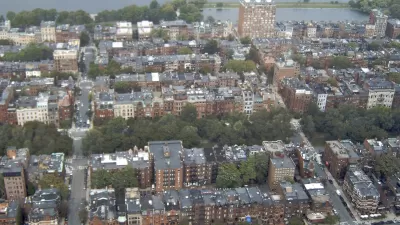Paris's most tourist-friendly neighborhoods are getting less dense: falling fertility rates, rising costs, and home sharing are all suspected as possible culprits.

Paris's most central areas are losing population, "Between 2009 and 2014, the number of people living in Paris’s 1st arrondissement, a small, touristy district that’s home to the Louvre, fell by 5%," Alison Griswold reports in Quartz. The statistics come from Insee, France's National Institute of Statistics and Economic Studies, which credits "Paris’s population drop to several causes: lower birthrates and second homes, to be sure, but also an increase in deaths, and higher living costs that are leading young people to settle down outside the city," Griswold writes.
Some of Paris's elected officials see a simpler explanation, "…1st arrondissement mayor, Jean-François Legaret, told Le Parisien that Airbnb '…has been a catastrophe for central Paris,' Griswold writes. There can be no doubting that Airbnb has a big footprint in the city. According to Griswold, "The French capital is Airbnb’s second-biggest market—behind only the New York City metro area in terms of total listing." It's hard to know how much of the loss of density in these neighborhoods is the result of these listings, but it's clear that Paris's regulators are running out of patience with the company.
FULL STORY: Paris is blaming Airbnb for population declines in the heart of the city

Planetizen Federal Action Tracker
A weekly monitor of how Trump’s orders and actions are impacting planners and planning in America.

San Francisco's School District Spent $105M To Build Affordable Housing for Teachers — And That's Just the Beginning
SFUSD joins a growing list of school districts using their land holdings to address housing affordability challenges faced by their own employees.

The Tiny, Adorable $7,000 Car Turning Japan Onto EVs
The single seat Mibot charges from a regular plug as quickly as an iPad, and is about half the price of an average EV.

Seattle's Plan for Adopting Driverless Cars
Equity, safety, accessibility and affordability are front of mind as the city prepares for robotaxis and other autonomous vehicles.

As Trump Phases Out FEMA, Is It Time to Flee the Floodplains?
With less federal funding available for disaster relief efforts, the need to relocate at-risk communities is more urgent than ever.

With Protected Lanes, 460% More People Commute by Bike
For those needing more ammo, more data proving what we already knew is here.
Urban Design for Planners 1: Software Tools
This six-course series explores essential urban design concepts using open source software and equips planners with the tools they need to participate fully in the urban design process.
Planning for Universal Design
Learn the tools for implementing Universal Design in planning regulations.
Smith Gee Studio
City of Charlotte
City of Camden Redevelopment Agency
City of Astoria
Transportation Research & Education Center (TREC) at Portland State University
US High Speed Rail Association
City of Camden Redevelopment Agency
Municipality of Princeton (NJ)





























